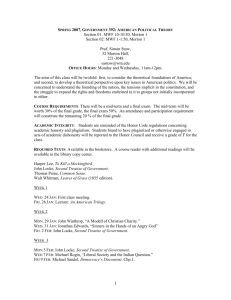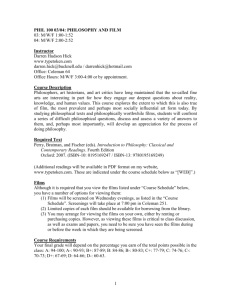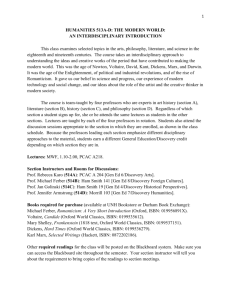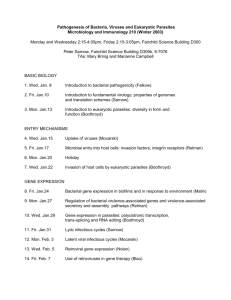English 470.01 - Paws.wcu.edu.
advertisement
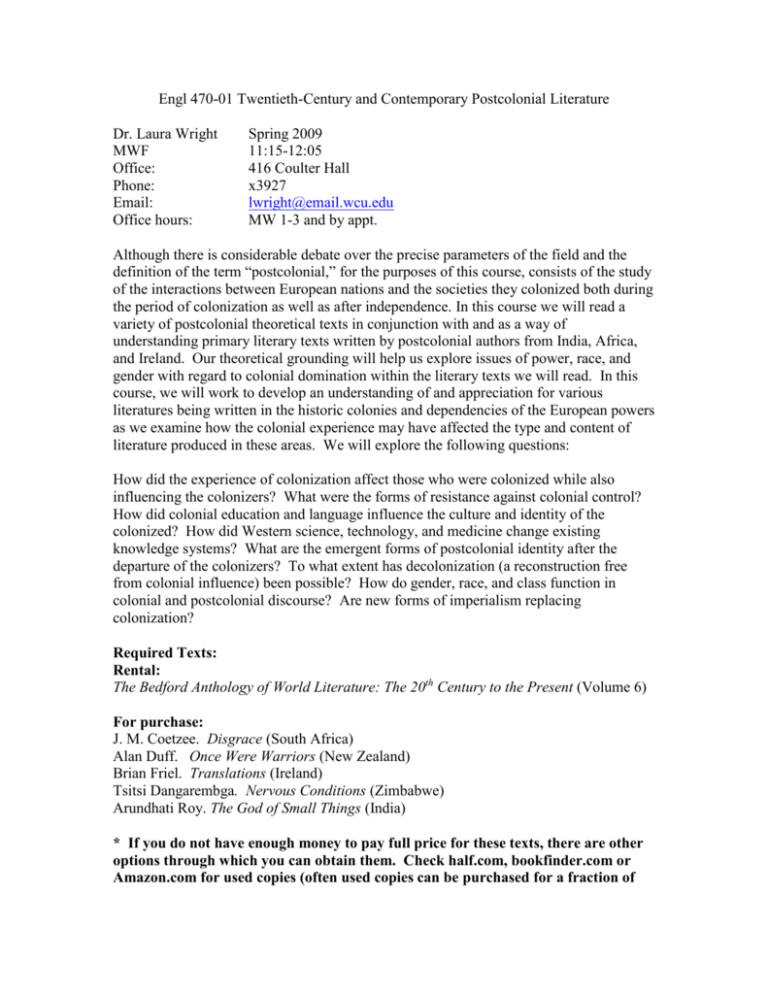
Engl 470-01 Twentieth-Century and Contemporary Postcolonial Literature Dr. Laura Wright MWF Office: Phone: Email: Office hours: Spring 2009 11:15-12:05 416 Coulter Hall x3927 lwright@email.wcu.edu MW 1-3 and by appt. Although there is considerable debate over the precise parameters of the field and the definition of the term “postcolonial,” for the purposes of this course, consists of the study of the interactions between European nations and the societies they colonized both during the period of colonization as well as after independence. In this course we will read a variety of postcolonial theoretical texts in conjunction with and as a way of understanding primary literary texts written by postcolonial authors from India, Africa, and Ireland. Our theoretical grounding will help us explore issues of power, race, and gender with regard to colonial domination within the literary texts we will read. In this course, we will work to develop an understanding of and appreciation for various literatures being written in the historic colonies and dependencies of the European powers as we examine how the colonial experience may have affected the type and content of literature produced in these areas. We will explore the following questions: How did the experience of colonization affect those who were colonized while also influencing the colonizers? What were the forms of resistance against colonial control? How did colonial education and language influence the culture and identity of the colonized? How did Western science, technology, and medicine change existing knowledge systems? What are the emergent forms of postcolonial identity after the departure of the colonizers? To what extent has decolonization (a reconstruction free from colonial influence) been possible? How do gender, race, and class function in colonial and postcolonial discourse? Are new forms of imperialism replacing colonization? Required Texts: Rental: The Bedford Anthology of World Literature: The 20th Century to the Present (Volume 6) For purchase: J. M. Coetzee. Disgrace (South Africa) Alan Duff. Once Were Warriors (New Zealand) Brian Friel. Translations (Ireland) Tsitsi Dangarembga. Nervous Conditions (Zimbabwe) Arundhati Roy. The God of Small Things (India) * If you do not have enough money to pay full price for these texts, there are other options through which you can obtain them. Check half.com, bookfinder.com or Amazon.com for used copies (often used copies can be purchased for a fraction of the full-price). Failure to obtain these required texts will result in failure of the course. Grades will be based on a discourse deliberation assignment (25%), a research paper (35%), a final exam (25%), and class participation (in the form of discussion, preparation of introductory questions at least once during the semester, close reading assignments, and one group presentation) and response assignments (15%). I will provide prompts for the response assignments. These must be typed and should be approximately 1 page long. Presentations: Once during the semester, you will be required to introduce the author and colonial/cultural context of one work, and the material covered in the work itself. Your presentation should consist of some historical and biographical information about the author and culture, and it should consist of a brief summary of the high points of the reading. Finally, you will need to formulate three discussion questions to present to the class in order to begin discussion on the day of your presentation. Handouts are welcome and encouraged. Presentations should be approximately 15 – 20 minutes. This is a discussion-based course; therefore, I will expect you to participate in class discussions, to ask questions, and to offer answers to the questions of your classmates. The number of quizzes that you will have will depend on how regularly I feel that this class is reading and participating in discussion Late papers/assignments: Unless you discuss problems with me in advance (not five minutes before class), I will not accept late assignments. However, if you talk to me and I agree to let you turn in a late assignment, you will receive a letter grade deduction on the assignment. Furthermore, you will only be allowed to turn in one late assignment (and only if I say it’s OK to do so); any subsequent late work will not be accepted. You will not be able to pass this class unless you complete all assignments. I will not accept any assignment sent to me via e-mail. I love to communicate by use of e-mail, but this medium is not an acceptable way to submit papers for this particular course. If you are having trouble with an assignment, please speak to me as soon as possible. Attendance: Because this is a discussion-based class, your attendance and participation are of vital importance. Therefore, you are allowed three absences, the equivalent of one week’s worth of class. Any absence after three will result in a 1/3-letter grade deduction from your final grade, and eight absences will result in automatic failure for the course. If you know that you will need to miss class for any reason, speak to me ASAP. You will still be responsible for any work that you miss when you are absent. Plagiarism: (from the student handbook) Academic Honesty Policy. Western Carolina University, a community of scholarship, is also a community of honor. Faculty, staff, administrators, and students work together to achieve the highest standards of honesty and integrity. Academic dishonesty is a serious offense at WCU because it threatens the quality of scholarship and defrauds those who depend on knowledge and integrity. Academic dishonesty includes the following: A. Cheating. Intentionally using or attempting to use unauthorized materials, information, or study aids in any academic exercise. B. Fabrication. Intentional falsification or invention of information or citation in an academic exercise. C. Plagiarism. Intentionally or knowingly representing the words or ideas of someone else as one’s own in an academic exercise. D. Facilitation of Academic Dishonesty. Intentionally or knowingly helping or attempting to help someone else to commit an act of academic dishonesty, such as knowingly allowing another to copy information during an examination or other academic exercise. Engaging in any of the above activities will result in a final grade of F in the course. Furthermore, as per WCU’s academic dishonesty policy, all cases of academic dishonesty will be turned over to the department head who will determine further action. A first offense may place a student in jeopardy of suspension from WCU; a repeat offense may result in expulsion from the university. Accommodations for Students with Disabilities: Western Carolina University is committed to providing equal educational opportunities for students with documented disabilities. Students who require disability services or reasonable accommodations must identify themselves as having a disability and provide current diagnostic documentation to Disability Services. All information is confidential. Please contact Disability Services for more information at (828) 227-2716 or 144 Killian Annex. Grading Scale: A = 93-100%, A- = 90-92%, B+ = 87-89%, B = 83-86%, B- = 80-82%, C+ = 77-79%, C = 73-76%, C- = 70-72%, D+ = 67-69%, D = 63-66%, D- = 60-62%, F = Below 60% The following matters are non-negotiable: 1. Attending class without the book in which the reading is due or without having done the reading will result in a zero for homework and participation for that day’s class. 2. You will not be eligible to pass this class unless you complete all assignments. 3. Handwritten assignments at the college level are unacceptable. I will not accept handwritten work from you under any circumstances. 4. Final drafts of essays will not be accepted unless I have seen and critiqued a preliminary draft of the essay. Week 1 Mon., Jan. 12: Introduction to course. Some terminology: language, culture, orality, binary oppositions, colonization. Wed., Jan. 14: Heart of Darkness (Bedford, 35-59) Fri., Jan. 15: Introductions. Discuss reading. Continue Heart of Darkness (59-78) Week 2 Mon., Jan. 19: MLK Day: No Class Wed., Jan. 21: Heart of Darkness (78-end) Close reading exercise #1 due * Note: close reading exercises will be due every Wednesday unless otherwise specified on the syllabus. Fri., Jan. 23 “An Image of Africa” (Bedford, 107-117) Things Fall Apart (Bedford, 1023-1050) Week 3 Mon., Jan. 26: Things Fall Apart (to the end of Part 1) Excerpt from Efuru by Flora Nwapa (handout/webcat) Wed., Jan. 28: Response assignment 1 due. From The Wretched of the Earth (Bedford, 128-135) Fri., Jan. 30: Discuss reading. Nervous Conditions Week 4 Mon., Feb.2: PRESENTATION 1: ZIMBABWE, DANGAREMBGA, NERVOUS CONDITIONS Discuss advertisements and assign Discourse Deliberation essay NC Wed., Feb. 4: Close reading exercise #2 due. Discuss reading. NC Fri., Feb. 6: Show Film clips from Blood Diamond and The Last King of Scotland NC Week 5 Mon., Feb. 9: Finish NC Response assignment 2 due. Wed., Feb. 11: Peer review draft 1 of essay 1. Fri., Feb. 13: Disgrace Week 6 Mon., Feb. 16: Discuss reading. Return drafts of essay 1. PRESENTATION 2: SOUTH AFRICA, COETZEE, DISGRACE Disgrace Wed., Feb. 18:Close reading #3 due. Disgrace Fri., Feb. 20: Disgrace Week 7 Mon., Feb. 23: Discuss reading. Final draft of essay 1 due at the beginning of class. In class deliberation. Wed., Feb. 25: Close reading #4 due. Disgrace Watch Long Night’s Journey into Day. Fri., Feb. 27: Finish Disgrace Continue discussion of TRC, Long Night’s Journey Week 8 Mon., Mar. 2-Fri., Mar. 6: Spring Break – No Class Week 9 Mon., Mar. 9: Response assignment 3 due. Return and discuss essay 1. Once Were Warriors Wed., Mar. 11: Close reading #5 due. Once Were Warriors Discuss reading. PRESENTATION 3: NEW ZEALAND, DUFF, ONCE WERE WARRIORS Fri., Mar. 13: Once Were Warriors Week 10 Mon., Mar. 16: Once Were Warriors Wed., Mar. 18: Close reading #6 due. Watch clips from film Once Were Warriors Finish Once Were Warriors Fri., Mar. 20: Gandhi (Bedford, 1284-88) Excerpt from Midnight’s Children (handout/webcat) Week 11 Mon., Mar. 23: The God of Small Things Wed., Mar. 25: Close reading #7. Discuss reading. PRESENTATION 4: INDIA, ARUNDHATI ROY, GST GST Fri., Mar. 27: GST Week 12 Mon., Mar. 30:Discuss reading. Assign essay 2. GST Wed., Apr. 1:Close reading #7 due. Discuss reading. Finish GST. Fri., Apr. 3: Response assignment 4 due. Library research day. Week 13 Mon., Apr. 6: William Butler Yeats (181) Wed., Apr. 8-Fri., Apr. 10: Easter Holiday Week 14 Mon., Apr. 13: Translations Wed., Apr. 15: Close reading #8. PRESENTATION 5: IRELAND, BRIAN FRIEL, TRANSLATIONS Translations Fri., Apr. 17: From How the Irish Became White (MyCat) Response Assignment 5 due. Week 15 Mon., Apr. 20: Film: The Loaded Weapon Wed., Apr. 22: Draft 1 of essay 2 due. Fri., Apr. 24: No regular class meeting – meet in individual conferences. Week 16 Mon., Apr. 27: From Is Canada Postcolonial? (handout/webcat) Wed., Apr. 29: PRESENTATION 6: CANADA, MARGARET ATWOOD “Death by Landscape” (handout/webcat) Fri., May 1: Essay due. Exam preparation.



